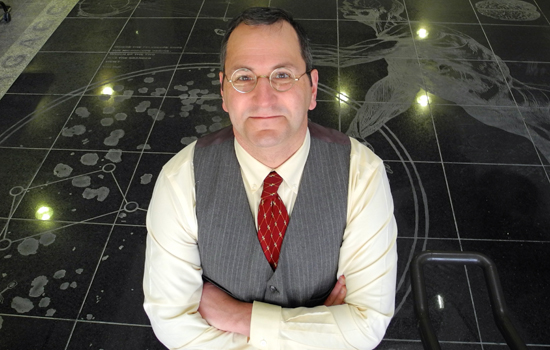RIT scientist chosen as educator ambassador
Brian Koberlein will inform public about U.S. astronomy efforts
Astrophysicist Brian Koberlein is one of nine educators to participate in the Astronomy in Chile Educator Ambassadors Program.
A scientist at Rochester Institute of Technology has been selected for the National Science Foundation’s Astronomy in Chile Educator Ambassadors Program.
Brian Koberlein, senior lecturer in RIT’s School of Physics and Astronomy, is one of nine astronomy educators chosen to communicate to the public U.S. research efforts conducted at observatories in Chile. The ambassadors program is made possible through collaboration between Associated Universities Inc., the National Radio Astronomy Observatory, National Optical Astronomy Observatory and Gemini Observatory.
The ambassadors will visit telescope sites in the Chilean mountains June 20–30. They will learn about the instruments, research and data collected at ALMA (Atacama Large Millimeter/submillimeter Array), CTIO (Cerro Tololo Inter-American Observatory) and Gemini Observatory and receive training in communicating STEM (science, technology, engineering and math) concepts to the public.
“While I’ve used some of the data from these telescopes in my research, I’m looking forward to seeing the process first hand,” Koberlein said. “I hope to bring that connection to my students, and being able to talk about the process behind the data will help students see science as a collaborative human endeavor.”
Following the trip to Chile, Koberlein and his fellow ambassadors will convey the value of astronomical research beyond the scientific community. They will highlight discoveries and technological advancements resulting from the nation’s investment in astronomy infrastructure in Chile.
“Much of my outreach efforts are through my blog, but I’ll also be giving several live presentations to the general public,” Koberlein said. “This is particularly important when communicating science to children, since it gives them the opportunity to see scientists as real individuals and not simply strange people in lab coats.”
Chile has become a prime location for astronomical observation in the southern hemisphere due to its dry-air conditions and clear skies. By 2022, an estimated 70 percent of the world’s telescopes will be located in Chile, according to the National Radio Astronomy Observatory.
The NRAO also reports that the United States will invest nearly $1.5 billion in the Large Synoptic Survey Telescope, an NSF and U.S. Department of Energy effort under construction in Cerro Pachón, and the Giant Magellan Telescope, a U.S.-led international collaboration planned for Las Campanas Observatory.
“My goals for the experience are to gain a better understanding of the ways in which modern large telescopes operate, and also to be able to interact with other science communicators to see how they bring ideas in science to the general public,” Koberlein said.
He has built a career communicating science to different audiences. His academic writing includes several published research articles and the undergraduate textbook Astrophysics Through Computation.
Koberlein’s outreach efforts strive to make science accessible to the public, as taxpayers and informed citizens. His popular blog, One Universe at a Time, has appeared in websites like EarthSky, Nautilus, Universe Today and From Quarks to Quasars. His website has expanded to include the weekly “One Universe at a Time Podcast,” produced with support from the RIT College of Science.
Koberlein’s growing reputation as a science communicator has led to expert interviews in mainstream media outlets, including NBC.com, Ottawa Citizen and The Christian Science Monitor.
His outreach efforts also extend to children. Koberlein is a founding member of Prove Your World, a 501(c)(3) not-for-profit organization, providing scientifically accurate, pedagogically sound and entertaining science programming for 8- to 13- year olds across web-based and traditional media.
To hear Brian Koberlein talk about the importance of science communication, go to the "RIT Expert: Brian Koberlein, Senior Lecturer, Phsyics" video.









